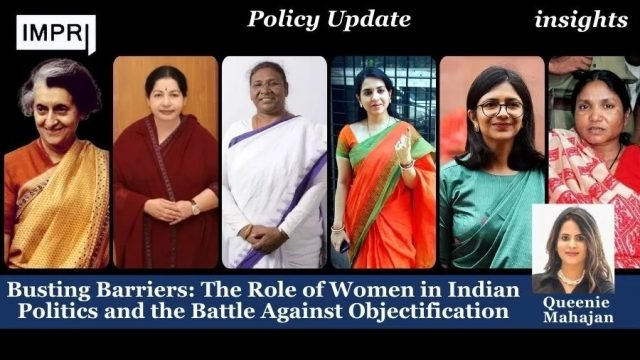Queenie Mahajan
Despite the heightened societal male scrutiny, women continue to make strides in India’s politics. Women pollical leaders from Indira Gandhi to Droupadi Murmu had suffered gendered objectification, whose clothes, background, and relationships were given more importance than their political careers. The career of these women political leaders has shown that with their perseverance and exceptional political dealings, they can defy societal norms around leadership for women in their society.
The Scrutiny of Politics and its Double Standards
Let’s take the scenario of a male politician attending a rally. His speech becomes a news, his approach is analyzed, and he is reviewed with his leadership ‘skillset’.
Now, imagine the case of women political leader. What is observed and noted from a women political leader during the same rally is completely different though. Instead of political policies, she attends to the media’s zoomed agenda of her outfit choice, facial expressions, and other mundane activities afflicting her personal life. These two political situations are not made up. It is the everyday experience for women in India’s politics.
India has had some strong women in the past, but their journeys were often struck off by character assassination, moral policing, and sexism. The Indian political landscape has always been a man’s world, with customs and traditions defining what a woman can or cannot do. Be it Indira Gandhi in her younger days being referred to as a “gungi gudiya” (gullible doll), J, Jayalalithaa being made fun of her weight, or Droupadi Murmu’s underprivileged status being held against her, the reality is clear; women are always criticized and judged differently when they are in power.
When Objectification Rules Over Leadership
1. Indira Gandhi: Walking Through The Man’s World Of Dominance
As an accomplished leader, Indira Gandhi was the first Female Prime Minister of India, and her time in office was filled with praise as well as criticism. While being an adept politician, she always encountered and suffered from gendered critiques.

The Times News Paper Archive October 23, 1970, Page 55 retrived from nytimes.com
While talking about her journey, she has said, “I am in no sense a feminist, but I believe in
women being able to do everything… Given the opportunity to develop, capable Indian
women have come to the top at once.”
During the Emergency period (1975 – 1977) Indira Gandhi was critically accused for her
authoritarian rule, drawing sexist label “power-hungry women” (BBC News).
Throughout her career, Indira Gandhi suffered from and was the target of personal attacks
that damaged her image claiming she was a woman and therefore controlling her life.
Withstanding the aftermath of such hardships became the benchmark for many upcoming
women in politics.
2. J. Jayalalithaa: From Movies to Politics
J. Jayalalitha was once the focal point of attention as an actress, later transitioned into politics as the Chief Minister of Tamil Nadu. Throughout her journey, she was subject to personal insults and body shaming. In 1989, she was physically assaulted at Tamil Nadu Assembly, where her saree was pulled off. This was an act of pure misogyny designed to humiliate J. Jayalalitha publicly (Hindusthan Times).


Iconic Image of J. Jayalalitha with her torn saree (The News Minute)
Media attention was only directed towards the personal side of her life with no regard to her political accomplishments. Beside Jayalalithaa’s sustained political power in Tamil Nadu which underscores her extraordinary strength and commitment to public service.
Regardless of these public humiliation and media controversies, she strategically regained her image and was able to initiate a plethora of welfare schemes throughout the state (Tamil Nadu) and was lovingly called ‘Amma’ (mother in English) by her supporters.
3. Droupadi Murmu: The First Tribal Woman President
Droupadi Murmu was the first tribal woman to serve as the President of India. Her journey has certainly been remarkable. On women’s day, she made statements like, “The Indian woman is moving ahead with confidence… Women form half the population, and India — or any nation, for that matter — can go only as far as its women go” (Wikipedia).
This was the comment from Congress as a reply to Droupadi Murmu’s Speech “The President was getting very tired by the end. She could hardly speak, poor thing,”. Thederogatory word “the poor thing” clearly acts as a verbal harassment attacking Droupadi Murmu based on her social background and caste.


Picture sourced from Law Chakra
Murmu’s rise to the highest constitution position indubitably shows her strength, dedication, and hard work. This also challenges conventional biases and serves as a source of motivation
to women coming from backward classes. She was severely critiqued on symbolic appointment as President of India rather than acknowledging her experience and leadership commitment.
4. Kangana Ranaut: Defying Expectations in the World of Cinema
Kangana Ranaut, one of the leading actresses of the modern era, has not shied away from speaking about the issues women face in the entertainment world. To quote her, “On the whole, the system does not like an actress being smart. It is even worse if she happen to be more intelligent than the hero.” (Wikipedia)
Concerted discussions about gender relations in Bollywoood, have been ignited by Ranaut’s her remarks towards the prejudices of the industry and her noncompliance to set norms. In March, 2024 the actress Kangana Ranaut was chosen as a candidate from Mandi, Himachal Pradesh for the Lok Sabha Elections.
Following her nomination, the congress leader Supriya Shrinate shared a social media handle derogating Kangana Ranaut as sex worker with a photo of her in coset. Though the social media post was deleted, it still evoked controversy around the social media, attracting several sexist comments and memes against her. Kangana Ranaut boldly responded to this controversy, by highlighting the gendered political attacks stating that in case of men his ideology is criticised, while in case of women it is always her character and sexuality that’s targeted.


Social Media Post – reply of Kangana Ranaut for Supriya Shrinate’s Post (Source: X Platform @ANI Asian News International)
5. Shaina NC: Fashionista Turned Politician
Shaina NC is a politician who dabbles in fashion design, and like anyone else, she has her own share of stereotypes. In her own words, “Having come from a world where there is even a hint of glamour, stereotypes are expected…. Overcoming these challenges has been one of the toughest fights for me.” In November 2024, she was labelled with the derogatory term “imported maal” which objectifies women, by Shiv Sena (UBT) leader during the Maharashtra Assembly Election (Times of India).
Shaina’s experience captures biases against women who move from more glamorous sectors to serious politics. Her attempts to unpack these stereotypes demonstrate that greater inclusivity in politics is warranted.
6. Swati Maliwal: Fighting for Women’s Rights in Hard Times
Swati Maliwal, who is the Chairperson for the Delhi Commission for Women, is well known for being an active opponent of sexual harassment and violence towards women. In 2024, following a political character assassination attempt, conducted by her own party members, Swati Maliwal was severely attacked, receiving rape and death threats. She mentioned her suffering by stating, “I have seen how in the last one month, a survivor who chooses to fight for justice becomes so isolated and the pain she must endure is terrible.”
Swathi Maliwal’s unrelenting fight for justice, despite the attacks on her personally, proves how challenging the deeply rooted patriarchal violence structures is, which is something the society needs a courage to do.
7. Phoolan Devi: From the Bandit Queen to a Parliamentarian
Phoolan Devi, once popularly called the ‘Bandit Queen’, changed her own life and entered the halls of Parliament. Her life, prior to that as a politician, was marred by abuse and violence, and even once a politician, victimized by character assassination and social prejudices. Her assassination in 2001 silenced the empowerment of the marginalised.
Phoolan Devi’s life shows the high cost that society imposes on women who try to challenge the norm in a bid to get justice.
The world has heard the voices of women, but has that stopped the misogyny? Women politicians have suffered online abuse and trolling, and while these objectifications may be easy to extract hate from the truth is it is more complicated than that. These women are the face of female character assassination and deep rooted patriarchy of masculine dominance of Indian politics. These women political leaders have shown us what true strength is and encourages us to aim for more. But as the solution, there must be open invitation, criticism, and active contribution of society to change the environment every women political leaders are put through.
Humanity isn’t black or white rather its grey.
It’s time for a transformative political revolution, were misogyny is smashed and India paves a way for more inclusive and equitable political space.
The author of the article is Queenie Mahajan.
Disclaimer: All views expressed in the article belong solely to the author and not necessarily to the organisation.
Read more at IMPRI:
Lost in the Pursuit of Profit: The Dimming of Himalayan Heritage
Gaza’s uncertain future: Between diplomacy, development and displacement
Acknowledgment: This article was posted by Bhaktiba Jadeja, visiting researcher and assistant editor at IMPRI.



















